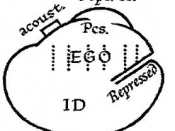AGGRESSION
What is aggression? During my research, I have noted various definitions of aggression and have often found it to be coupled with violence. This human trait is so complex that it is difficult to pinpoint any one description, but I believe that for the purpose of this essay, this extremely loose term will have to suffice, as aggression is viewed differently according to the different approaches. "Aggression - a wide variety of acts that involve attack" (The Penguin Dictionary of Psychology-Third Edition 2001)
In this essay, I will explain and evaluate three psychological approaches of aggression from Sigmund Freud, Burrhus F Skinner and Carl R Rogers.
Sigmund Freud (1856-1939) developed the psychoanalytical theory of the personality, whereby he divided it into layers; the unconscious, preconscious and the conscious. These represented different levels of awareness in our minds. He also described the personality as the id, which is essentially what we are born with and is where the basic sexual and aggressive drives reside, the ego, which starts to develop as soon as interaction with the environment begins, and the superego, which represents the moral aspect of humans according to society's standards and values.
He believed that we are born with these inner feelings of aggression, which we use as a tool to obtain the things we want, but unfortunately, society restricts the use of this horrible behaviour for obvious reasons. The display of aggressive behaviour would cause us to lose love and respect ending in lowered self-esteem. In order to get through life without imposing this unacceptable behaviour upon society, we have in our superego, incorporated something called 'guilt', which in turn makes us feel ashamed of this pushy, demanding insistence of gratification side of ourselves. However, this causes within us an eternal conflict that rages on through...


